Pierre-Simon-Benjamin Duvivier
Pierre-Simon-Benjamin Duvivier (3 November 1730 – 10 July 1819) was a French engraver of coins and medals.
Pierre-Simon-Benjamin Duvivier | |
|---|---|
%2C_by_Fran%C3%A7ois_Dumont.jpg) Pierre Simon Benjamin Duvivier (1730-1819), by François Dumont | |
| Born | 3 November 1730 Paris, France |
| Died | 10 July 1819 (aged 88) Paris, France |
| Nationality | French |
| Known for | Medallist |
Early years
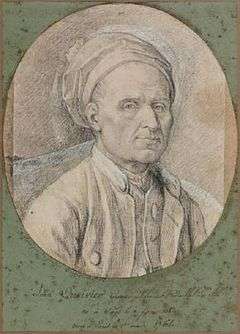
Pierre-Simon-Benjamin Duvivier was born in Paris on 3 November 1730. He was son of the well-known medallist Jean Duvivier and of his wife, Louise Vignon. His family originated from Liège.[1] His brother was Thomas-Germain-Joseph Duvivier, also a painter and engraver.[2] His sister Jeanne-Louise-Françoise married the engraver Jacques-Nicolas Tardieu and is on record as having made several engravings herself.[3]
Benjamin Duvivier was placed in the Collège Mazarin to study humanities and philosophy, where he met and befriended Abraham Hyacinthe Anquetil-Duperron and Nicolas Louis de Lacaille, the future astronomer. He planned to undertake a voyage of exploration with Anquetil-Duperron, but was forced to cancel it for reasons of health. When his father violently objected to his decision to follow a career in art, he left home and moved in with his sister and brother-in-law, the Academician Tardieu.[4] His mother died in 1752. On 25 September 1756 he won a medal from the Academy for a nature scene.[5]
Career
Benjamin Duvivier's father died on 30 April 1761. Benjamin applied to the king to retain the position that his father had occupied in the Louvre Galleries, and on 7 June 1762 this was granted to him, and he thus assumed his father's job as medallist to the King.[5] Benjamin Duvivier probably had more talent than his father.[6] On 24 November 1764 he was accepted as a Member of the Royal Academy of Painting and Sculpture. On 13 February 1765 he obtained a brevet royal that authorized him to spend a year in Italy.[7] On 21 August 1774 he obtained the position of general engraver of coins, replacing Joseph-Charles Roëttiers.[8]
Duvivier drew portraits of several members of the royal family during the reigns of Louis XV and Louis XVI.[9] Duvivier exhibited at the Salons of 1769, 1773, 1775, 1777, 1779, 1781, 1783, 1785, 1793 and 1798.[7] At the Salon of 1773, visitors could compare Duvivier's medal in honor of Frederick III, Duke of Saxe-Gotha-Altenburg with a portrait bust of the King by his friend Jean-Antoine Houdon.[10] In 1788 he was listed as a foreign associate of the Academy of Science and Arts that Alexandre-Marie Quesnay de Beaurepaire had founded in Richmond, Virginia. He made medals of George Washington and, in 1791, of Gilbert du Motier, Marquis de Lafayette.[9]
Duvivier taught his brother-in-law Pierre-Joseph Tiolier (1763-1819), who was appointed General Engraver of the mint in 1803.[11] During the French Revolution, on 11 July 1791 Duvivier's title and position were abolished and he was replaced by his former assistant Augustin Dupré.[9] In 1806 Duvivier was appointed to the engraving section of the Beaux-Arts school at the Institut de France.[12] He died in Paris on 10 July 1819. His son may have been the painter Français Duvivier, who opened an academy of drawing and painting in Philadelphia in 1796.[13]
Gallery
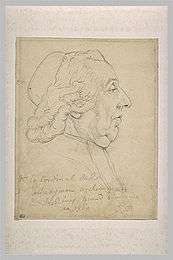 Cardinal Charles-Antoine de la Roche-Aymon (1760)
Cardinal Charles-Antoine de la Roche-Aymon (1760)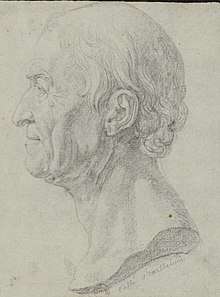 French archaeologist and numismatist Jean-Jacques Barthélemy (1716-1795)
French archaeologist and numismatist Jean-Jacques Barthélemy (1716-1795)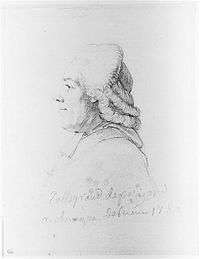 Portrait of Alexandre Angélique de Talleyrand-Périgord (1736-1821)
Portrait of Alexandre Angélique de Talleyrand-Périgord (1736-1821)
- Louis XV of France, 1767
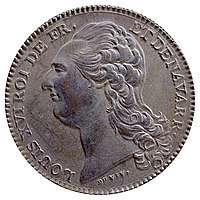 Medal of Louis XVI of France
Medal of Louis XVI of France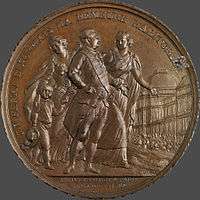 Medal commemorating the return of Louis XVI to Paris - 1789
Medal commemorating the return of Louis XVI to Paris - 1789
References
Citations
- Réunion des sociétés des beaux-arts ..., p. 339.
- Réunion des sociétés des beaux-arts ..., p. 438.
- Société de l'histoire de l'art français 1856, p. 64.
- Réunion des sociétés des beaux-arts ..., p. 340.
- Réunion des sociétés des beaux-arts ..., p. 341.
- L’art en France au XVIIIè siècle: Médailles.
- Réunion des sociétés des beaux-arts ..., p. 342.
- Réunion des sociétés des beaux-arts ..., p. 347.
- Karel 1992, p. 277.
- Poulet 2005, p. 302.
- Webb 1907, p. 259.
- Barre 1867.
- Karel 1992, p. 276.
Sources
| Wikimedia Commons has media related to Pierre-Simon-Benjamin Duvivier. |
- Barre, Albert (1867). Graveurs généraux et particuliers des Monnaies de France, contrôleurs généraux des effigies, noms de quelques graveurs en médailles de la Renaissance française. Paris.CS1 maint: ref=harv (link)
- Karel, David (1992). Dictionnaire des artistes de langue française en Amérique du Nord: peintres, sculpteurs, dessinateurs, graveurs, photographes, et orfèvres. Presses Université Laval. ISBN 978-2-7637-7235-6. Retrieved 2012-11-21.CS1 maint: ref=harv (link)
- "L'art en France au XVIIIè siècle: Médailles". B&S Encyclopédie. Retrieved 2012-11-21.
- Poulet, Anne L. (2005-06-01). Jean-Antoine Houdon: Sculptor of the Enlightenment. University of Chicago Press. p. 302. ISBN 978-0-226-67649-4. Retrieved 2012-11-21.CS1 maint: ref=harv (link)
- Réunion des sociétés des beaux-arts des départements ... 1889. Retrieved 21 November 2012.
- Société de l'histoire de l'art français (1856). Archives de l'art français. Nouv. période, tom. 7. Retrieved 18 November 2012.CS1 maint: ref=harv (link)
- Webb, Percy (1907). The Reign and Coinage of Carausius. Рипол Классик. ISBN 978-5-88181-419-9. Retrieved 2014-08-23.CS1 maint: ref=harv (link)
External links
- Pierre-Simon-Benjamin Duvivier in American public collections, on the French Sculpture Census website
